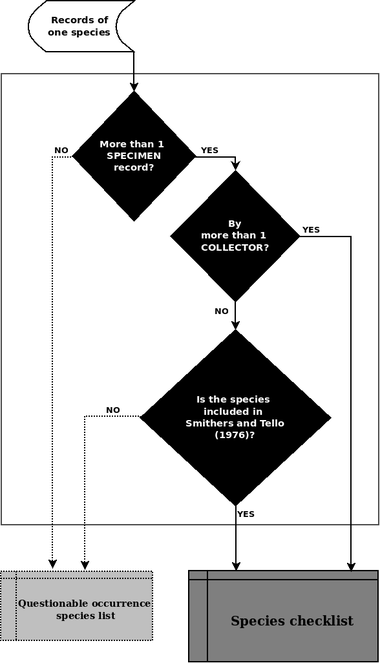|
Biodiversity Information Science and Standards : Conference Abstract
|
|
Corresponding author: Isabel Queirós Neves (i.queirosneves@gmail.com)
Received: 08 Apr 2019 | Published: 18 Jun 2019
© 2019 Isabel Neves, Maria da Luz Mathias, Cristiane Bastos-Silveira
This is an open access article distributed under the terms of the Creative Commons Attribution License (CC BY 4.0), which permits unrestricted use, distribution, and reproduction in any medium, provided the original author and source are credited.
Citation: Neves I, Mathias M, Bastos-Silveira C () Sharing the Decision Process Framework to Identify Well-supported Records of Mammal Species-occurrence in Mozambique. . https://doi.org/
|
|
Abstract
Conservation research and policies tend to be significantly restricted wherever relevant data on biodiversity is sparse, scattered or non-curated. Thus, the usefulness of occurrence data, for the study of biodiversity, depends not only on the availability but also on data quality. Notwithstanding the increase in the global availability of primary biodiversity data, they have numerous shortfalls, from incomplete or partially erroneous documentation to spatial and temporal biases (
We integrated existing knowledge, from dispersed sources of biodiversity data, namely Global Biodiversity Information Facility (GBIF), natural history collections, wildlife survey reports, species checklist and other scientific literature. This procedure allowed an update of Mozambique’s checklist of terrestrial mammals (
Species selection process framework - decision tree followed to establish whether the report of a species for the country was well-supported (as in
A species-occurrence record was considered well-supported and included into the species checklist when was:
- independently recorded by different collectors or
- recorded by a single collector but listed in
Smithers and Tello (1976) .
An additional list was produced which contained species with questionable occurrence in the country. Species entered this "questionable occurrence" list when they were:
- not listed in
Smithers and Tello (1976) , and a single record supported its presence in the country; - not listed in
Smithers and Tello (1976) and multiple records exist, but were all cited by a single author; or - registered with a single record in
Smithers and Tello (1976) .
We compiled more than 17000 records, resulting in a total of 217 species (14 orders, 39 families and 133 genera) with supported occurrence in Mozambique and 23 species with questionable reported occurrence (Table
Summary description of the species checklist of terrestrial mammals reported for Mozambique (Queirós Neves et al. 2018). The table shows, per mammal order, the total number of species in the Species checklist (‘Total’), the number of threatened species (‘Threatened Species’), the number of species reported with less than 10 records (‘< 10 records’), the number of species reported from Mozambique after the year 2000 (‘Recent Report’), the number of species with "Questionable Occurrence". Species are considered ‘threatned species when are classified as ‘Vulnerable’, ‘Endangered’ or ‘Critically endangered’ following the International Union for Conservation of Nature and Natural Resources (IUCN) Red List (2017).
| Order | Total | Threatened Species | < 10 records | Recent Report | Questionable occurrence |
| Afrosoricidae | 2 | 1 | 1 | - | |
| Artiodactyla | 25 | 3 | 1 | 24 | 3 |
| Carnivora | 33 | 4 | 6 | 21 | - |
| Chiroptera | 71 | 1 | 41 | 58 | 8 |
| Eulipotyphla | 9 | 3 | 7 | 4 | |
| Hyracoidea | 3 | 1 | 2 | - | |
| Lagomorpha | 4 | 2 | 2 | - | |
| Macrocelidea | 5 | 2 | 1 | ||
| Perissodactyla | 3 | 1 | 3 | - | |
| Pholidota | 1 | 1 | 1 | 1 | |
| Primates | 8 | 1 | 7 | - | |
| Proboscidea | 1 | 1 | 1 | - | |
| Rodentia | 51 | 1 | 17 | 33 | 6 |
| Tubulidentata | 1 | 1 | - | ||
| Total | 217 | 13 | 73 | 162 | 23 |
Keywords
Species checklist; Africa; Natural History Collections; Primary biodiversity data; Data quality
Presenting author
Cristiane Bastos-Silveira
References
-
The importance of data quality for generating reliable distribution models for rare, elusive, and cryptic species.PLOS ONE12(6). https://doi.org/10.1371/journal.pone.0179152
-
Seven shortfalls that beset large-scale knowledge of biodiversity.Annual Review of Ecology, Evolution, and Systematics46:523‑549. https://doi.org/10.1146/annurev-ecolsys-112414-054400
-
The terrestrial mammals of Mozambique: Integrating dispersed biodiversity data.Bothalia48(1). https://doi.org/10.4102/abc.v48i1.2330
-
Checklist and atlas of the mammals of Moçambique.8.The Trustees of the National Museums and Monuments of Rhodesia,Salisbury.
